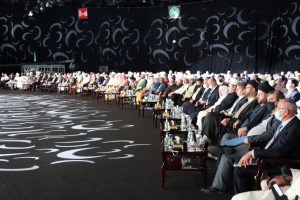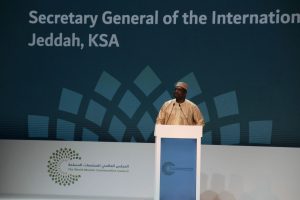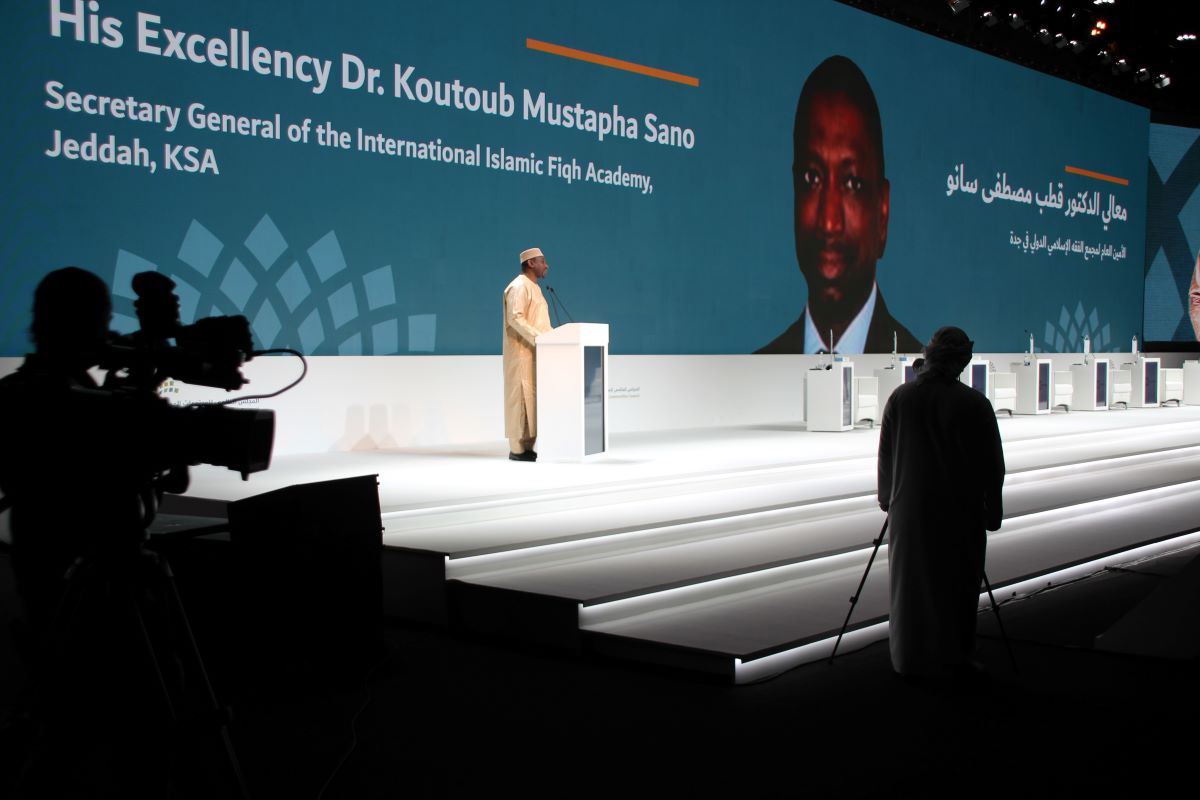
At the generous invitation of His Excellency Sheikh Nahyan bin Mubarak Al Nahyan, Minister of Tolerance and Coexistence of the United Arab Emirates, H.E. Prof. Koutoub Moustapha Sano, Secretary General of the International Islamic Fiqh Academy (IIFA), participated in the international conference organized by the World Council of Muslim Communities on: Islamic Unity: Concept, Challenges and Opportunities, on Sunday and Monday 7-8 of Shawwal 1443H corresponding to 9-10 May 2022G in Abu Dhabi, UAE.
His Excellency delivered a keynote speech at the opening of the second day of the conference in the presence of a large group of participants in the conference and thanked the Government and people of the United Arab Emirates for their tremendous efforts to unite the Ummah and promote cooperation and communication between Muslims. He also congratulated the leaders of the World Muslim Communities Council, the Presidency and Secretariat, on organizing this important timely conference at this difficult stage of the disturbing circumstances that the world in general and the Muslim world in particular are going through. His Excellency praised in particular the good selection of the title and themes of the conference, “in the hope that the participants in the conference will come up with a correct and clearly defined concept of the term unity. It will allow us also to correct a series of tendentious misconceptions that have been suddenly woven around this term, which we consider to be both old and new, it is old given the decades since its emergence, and new in view of the new concept to be adopted by this Conference, while seeking to highlight the most important intellectual, cultural, social, economic, educational and political challenges facing the Ummah at all levels, and ultimately the desire to make the most of the material and moral opportunities available to the Muslim peoples as a result of the diverse means of communication and the means of integration possible to achieve the desired unity”.
His Excellency pointed out that the term Islamic unity is one of the terms developed in the religion recently and employed badly for suspicious purposes contrary to the principles of Islam and is incorporated into areas where it cannot be achieved as a result of change and transformation. His Excellency then stressed that “the texts of the Holy Quran and the Prophetic tradition went beyond talking about Islamic unity in the traditional sense to talking about the unity of the Ummah, and Ummah, is broader and more comprehensive than peoples, clans and tribes, as they include non-Muslim individuals and groups, and these Islamic texts have decided that the existence of peoples, tribes and clans is a universal reality and an eternal will that cannot be overlooked as per the following Qur’anic passage: [O people, we have created you male and female, and we have made you peoples and tribes to get to know each other]. This verse indicates that there are multiple peoples and diverse tribes, and these compose what is now known as the nation-state, which is made up of individuals and groups sharing traditions and customs in a nation-state governed by a system to which they agree”.
Accordingly, the term unity is not intended to unite peoples in one people or to integrate tribes into one tribe and is not intended to transfer and rationally eliminate the traditions and customs of peoples, tribes and clans, but rather to unite in its proper concept “unity of feelings and unity of rituals among Muslims, which is a unity in diversity and diversity in unity possible among peoples and tribes, at the economic, social, educational and cultural level. Based on this, there is an urgent need today to transcend that pretentious concept that besieged and continues to besiege the concept of unity in uniting the Muslim peoples in one alleged and illusory state, which is the state of the great caliphate that has never been achieved throughout history; Knowing that the right Islamic unity is intended to achieve as much cooperation, integration, support and synergy as possible between Muslims. This is by no means incompatible with the multiplicity of states with the multiplicity of peoples and tribes whose existence is part of the eternal cosmic reality referred to earlier”.
His Excellency then explained that “the Islamic unity is based on five pillars stipulated in the Hadith of the Prophet, in which he says: {Do not be jealous, do not detest each other, do not be a wrong doer, do not betray, do not purchase what your brother wants to purchase, and be the servants of God and brothers. It is a great sin to disrespect your brother, oppress him or humiliate him}”. His Excellency concluded by saying: “The desired Islamic unity has three manifestations that are mentioned in the Hadith of the Prophet: {the similitude of the believers in their love, compassion, and sympathy is like one body if a member complains about pain, the rest of the body falls with fever and restlessness}. Love, compassion and mutual sympathy are the most important manifestations of true Islamic unity. Today, more than ever, the Ummah is called upon to strengthen these manifestations in terms of emotional bonds, feelings and rituals, so that the unity called for by the Qur’an and the Sunnah will be achieved”.
The conference was attended by more than 400 participants from more than 100 countries. Several prominent Islamic figures also participated, including His Excellency Sheikh Saleh bin Abdullah bin Hamid, Advisor to the Royal Court of Saudi Arabia, Imam of the Grand Mosque, President of the International Islamic Fiqh Academy; His Excellency Mr. Hussein Ibrahim Taha, Secretary General of the Organization of Islamic Cooperation; His Excellency Sheikh Abdullah bin Bayeh, President of the UAE Council for Shariah Fatwas; His Excellency Dr. Mohammed Mukhtar Juma, Egyptian Minister of Awqaf; His Excellency Prof. Ali Arbash, Head of the Directorate of Religious Affairs of Turkey; H.E. Dato Idris Ahmed, Minister of Religious Affairs in the Malaysian Prime Minister’s Department; H.E. Dr. Mohammed Abdul Sattar Al Sayed, Syrian Minister of Awqaf, and His Excellency Dr. Nur ul-Haq Qadri, former Pakistani Federal Minister for Religious Affairs and Interfaith Harmony, among others.

Read Also
Lastest








